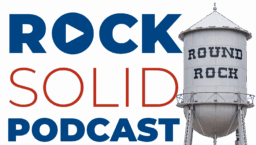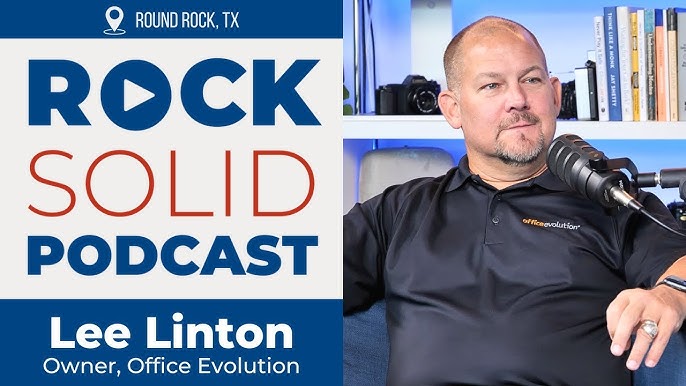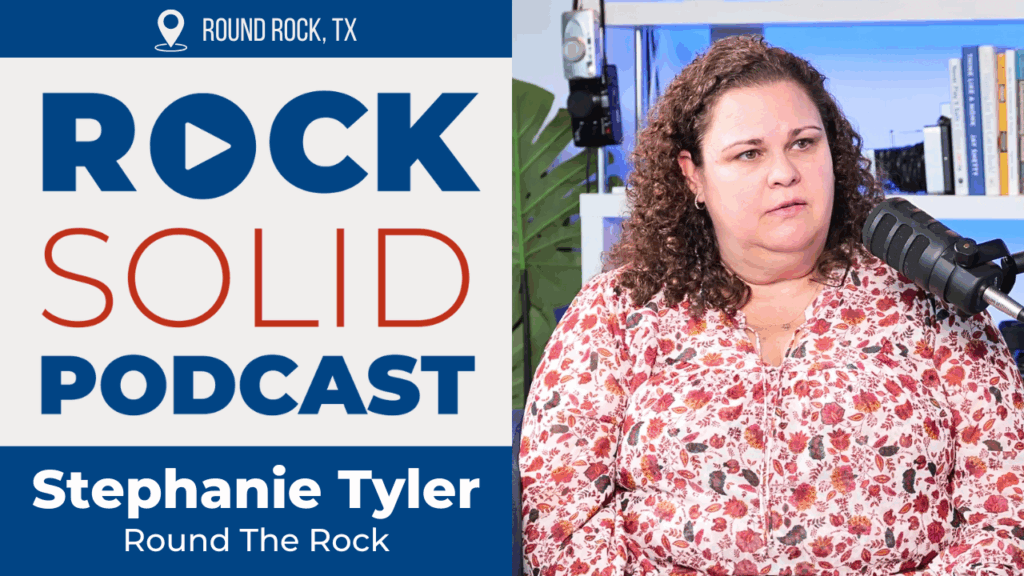What do horses, hope, and heart have in common? You’ll find all three at ROCK – Ride On Center for Kids – an extraordinary nonprofit nestled just on the edge of Round Rock and Georgetown.
In this week’s episode of the Rock Solid Podcast, I had the joy of sitting down with Karah Powell, one of the most inspiring community leaders I’ve had the privilege of interviewing. Karah is more than just the development director at ROCK. She’s a connector, a cheerleader for others, and a walking, talking masterclass in community engagement and compassionate leadership.
From Air Force to Rock Star
Karah’s journey started with military service at the former Air Force base in Austin, which eventually brought her to Round Rock in the early ’80s. Her path—rooted in resilience, empathy, and a drive to serve—shaped how she shows up for our community today. Whether she’s wearing her ambassador hat at the Round Rock Chamber or mentoring nonprofit leaders, Karah is a beacon of connection and courage.
As she put it: “If you want to be part of the community, don’t stay in your office. Get out there. Be the face.”
What Is ROCK?
ROCK began humbly in 1998 with one borrowed horse in a backyard. Today, it serves over 400 clients each year across 60 acres and with the help of 41 horses. The mission? To improve independence and life skills in partnership with the horse.
Yes, ROCK started with kids. But it’s not just for kids anymore.
Serving Veterans, Families, and Futures
ROCK’s programs now support adults and veterans too. From helping stroke survivors walk again to creating safe, healing spaces for veterans dealing with PTSD, the programs are backed by research—but powered by heart.
Every Tuesday night, veterans and their families gather for equine therapy, community meals, and connection. Thanks to generous donors and local businesses, these sessions are completely free to the veterans who’ve already paid the steepest price.
And when Karah says “we serve the whole family,” she means it. Whether it’s a grandparent stepping up as guardian or a caregiver in need of support, ROCK is there—with horses, meals, mentors, and resources.
Leadership Lessons from a Life of Service
When I asked Karah where her energy and leadership came from, she didn’t skip a beat. Experience, instinct, and a lot of love—from her partner Glenn, from her mentor and boss Nancy, and from the community itself.
She reminded us all of one of the golden rules of business and nonprofits alike: “Don’t bank on one customer.” ROCK’s funding model relies on individual donors, small businesses, and foundations—not government grants—giving it the freedom and resilience to serve no matter the storm.
Want to Help?
There’s a waiting list for kids. There’s always room for veterans. There’s always a place at the table for those who want to support.
Whether you’re looking to volunteer, donate, or just learn more about how healing happens on horseback, Karah would love to show you around. Reach out at cara@rock.org or visit rockride.org.
Or better yet—stop by. Wear closed-toe shoes. Bring a little curiosity. And prepare to be changed.
Want to hear the full conversation with Karah? Listen now on the Rock Solid Podcast. You’ll walk away with more than just inspiration—you’ll walk away with direction. Because that’s what leaders like Karah Powell do. They help us all find our way forward—together.
Transcript:
Bryan Eisenberg:
Welcome to Rock Solid, the Round Rock Business Leaders Podcast. I’m your host, Bryan Eisenberg, and I’m here at Round Rock Studio with a special guest from the ROCK Ride On Center for Kids. Let’s rock and roll.
Karah Powell:
Absolutely. Lots of rocks today!
Bryan:
Let’s start with your story. You’ve been in the Round Rock area a long time—and you actually landed here through your service in the Air Force when the Austin airport was still an Air Force base?
Karah:
Yes, I was 17 when I moved here, back in 1983. I was a Morale, Welfare, and Recreation specialist. Funny how they pegged me for that job after only six weeks in basic training!
Bryan:
They knew what they were doing! And you’ve always been that morale booster. I met you when you were chair of the Round Rock Chamber. You’ve been a big inspiration to me.
Karah:
Thank you. I truly believe the community is the heart of everyone’s heartbeat. It’s not about me—it’s about us.
Bryan:
You have this incredible mission: helping people find their passion and cause. Where does that come from?
Karah:
We moved every six months growing up. My dad worked for Brown & Root along the coastline, and I had to meet new people constantly. I learned that if I wanted connection, I had to reach out. That stuck with me.
Bryan:
So how would you advise someone new to Round Rock—maybe just opening their business—on how to plug into the community?
Karah:
If your business relies on local people, don’t stay in your office. Be the face. Get involved. Join the Chamber. Connect with Round Rock and Georgetown. It’s about building relationships.
Bryan:
Let’s talk about ROCK. I know our mutual friend Will Williams said it changed his life. Tell us about what you all do.
Karah:
ROCK started in 1998 with one horse in a borrowed backyard. Nancy Krenek, our founder, is a physical therapist who believed kids with disabilities could thrive beyond labels. On a horse, they weren’t “kids with Down syndrome” or “kids with cerebral palsy”—they were just kids.
Today, we have 41 horses, we serve over 400 clients a year, and we sit on 60 acres at the edge of Round Rock and Georgetown. Our mission is to improve independence and life skills through partnership with the horse.
Bryan:
And it’s not just kids anymore, right?
Karah:
Right. In 2003, we started working with adults. One of our first was Mr. Hoppy, a stroke survivor. Then in 2005, Fort Hood reached out about working with veterans. We started with outdoor arenas and porta-potties, but the healing was real. Now, we have two massive arenas: Sport Clips Heroes Arena and Merlin Hoppy Arena.
Bryan:
What does it look like when a veteran joins the program?
Karah:
Every Tuesday night, we host a co-ed veterans group. There’s a community meal donated by local businesses—Schlotzsky’s, Blue Corn Harvest, Smokey Mo’s, you name it. Veterans come with spouses, kids, even grandkids. They don’t start riding right away—they begin by learning how to groom, care for, and lead a horse.
If you can lead a horse, you can learn to lead your life again.
Bryan:
That’s powerful. And how do you keep it funded?
Karah:
We don’t rely on federal grants. Two-thirds of our support comes from individuals and local companies. It’s diversified by design. COVID taught us the importance of that—when our 2020 fundraiser was canceled, we pivoted online and raised nearly $380,000.
Bryan:
Let’s say a family is interested in getting a child involved. What’s that process?
Karah:
We follow the school calendar. Each child gets a set time each week, a dedicated horse, instructor, and volunteer team. It’s a tuition-based model ($65–$110 per week), but we have scholarship funding available.
There’s a waiting list because this work is so impactful, but we always try to match openings based on need and fit. Some kids even go on to compete—like at the Gold Stirrup rodeo during Rodeo Austin!
Bryan:
And veterans?
Karah:
Veterans attend a 24-week program completely free of charge. We partner with organizations like Sport Clips Foundation, H-E-B, and the VFW to cover their costs. The healing they experience isn’t just physical—it’s mental, emotional, and relational.
Bryan:
Where does your energy and leadership come from?
Karah:
Experience. Intuition. And my husband Glenn, who encourages me to do what I love. I also credit Nancy Krenek for allowing me to grow outside the organization—because knowing other local agencies helps us serve our families better.
I worked in corporate America until 2010. After leaving, I pursued nonprofit training at Austin Community College using my GI Bill. It changed my life.
Bryan:
You’ve seen Round Rock evolve. What do you love most about this community?
Karah:
Our city leaders genuinely care. They’re not politicians first—they’re neighbors who want to make Round Rock better. They listen, they collaborate, and they plan for the future. It’s our turn to shape what this community will look like in 60 years.
Bryan:
How can people connect with you or get involved with ROCK?
Karah:
You can find me on Facebook or email me at cara@rock.org. I also run Tiara Tuesday Wilco Style—a networking group for women who want to keep their crowns on straight. We meet monthly, and I’m always happy to mentor or connect with others.
And if you come visit ROCK, don’t call it a “selfie.” Call it an “us-ie.” Because it’s never about just me or you. It’s about us.
Bryan:
Beautifully said. Thank you, Karah.


